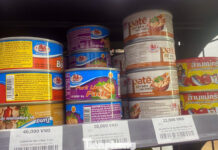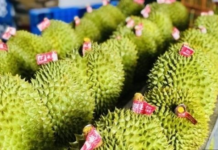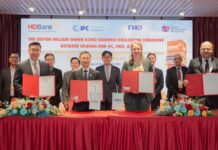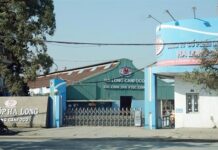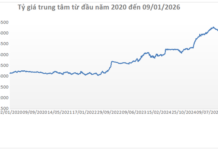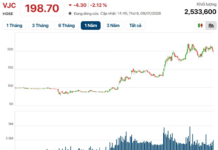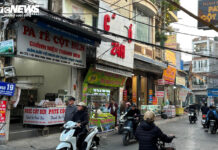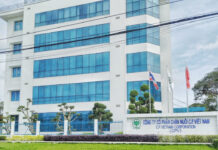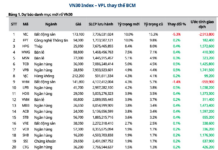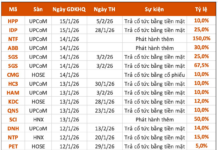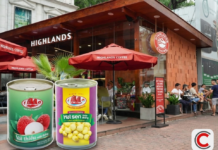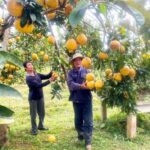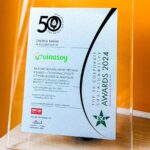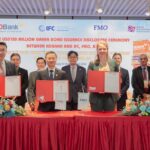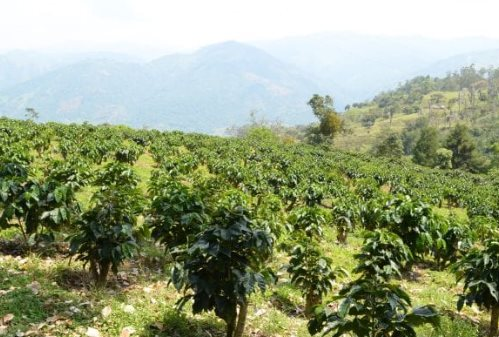The scorching July sun beats down on the lush vegetable patches as Sister Tong Thi Hien wades through the waist-high water, wearing a conical hat and rolled-up pants. She holds a bunch of freshly cut water spinach, her face glistening with sweat, and exclaims with a smile, “This used to be abandoned land, overgrown with grass taller than our heads. People were reluctant to rent or farm it as traditional methods couldn’t yield enough for sustenance. But things are different now.”
TRANSFORMING WASTELAND INTO A LUSH FARM
Sister Hien, a resident of Dong Tien ward in Thanh Hoa province, took on what many considered a “crazy” endeavor in 2018 when she decided to gather unused land to create a farm. At that time, the area consisted of low-lying fields with difficult access and no irrigation systems, and the idea of centralized agriculture seemed far-fetched.
“Convincing the locals was the hardest part,” she recalls. “Everyone told me they wouldn’t sell or rent their land and wanted to keep it for security. I had to visit each household, persistently pleading my case until they finally agreed.”
Initially, Sister Hien and her husband managed to lease 3 hectares of land. The vast expanse of wilderness was covered in thickets, with no roads, electricity, or water access. Standing amidst this desolation, she admits to having moments of doubt, unsure of where to begin.
However, the couple persevered. They laid concrete roads to make the area accessible by motorbike and plow, installed electrical wiring, and constructed a drainage system throughout the farm. On scorching days, they toiled in the mud, their bodies exhausted. “There were times when we felt overwhelmed and disheartened,” Sister Hien says, smiling as her eyes reflect determination, “but our love for our homeland and farming kept us going.”
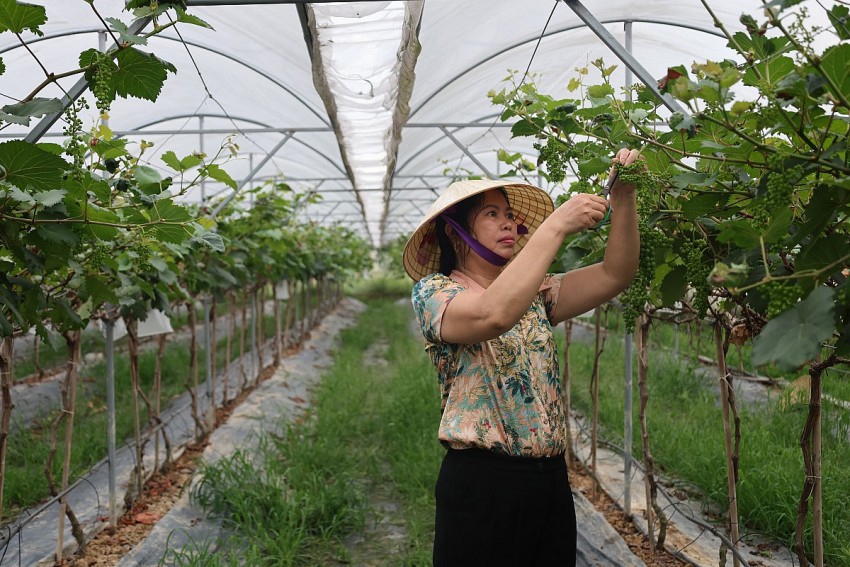
Two years later, Sister Hien acquired additional land, expanding the farm to 7 hectares. Thus, the Hien Nhuann farm—a combination of the couple’s names—was born. The farm cultivates over 30 types of vegetables, fruits, and tubers, including water spinach, morning glory, bitter melon, pumpkin, sweet potatoes, yellow melon, and black seed grapes. They also raise black pigs and Hmong chickens.
What sets this farm apart is Sister Hien’s staunch refusal to use chemicals. “No weed killers or growth stimulants are used here,” she asserts. “The vegetables grow alongside the grass, and after each harvest, we cut and compost the grass to return nutrients to the soil. We only use well-rotted manure as fertilizer,” she explains, pointing to a pile of compost near the trees.
By adhering to organic practices, the produce from the Hien Nhuann farm is highly sought after in the market. Their main clients include supermarkets, canteens, and clean food stores in nearby urban areas. “This method is more labor-intensive, and the yield may not be as high as mass production, but the quality is guaranteed. Our vegetables are tasty and safe, giving our customers peace of mind,” Sister Hien proudly states.
Today, the farm boasts internal roads, greenhouses, a packing area, and a storage facility. Fresh vegetables are harvested, packaged, and transported to consumers daily.
“OUR FARM HAS GIVEN US A SENSE OF PURPOSE”
The Hien Nhuann farm is more than just a place of production; it also provides stable employment for about 20 local workers, mostly elderly individuals. Ms. Do Thi Tam, 65, who has been with the farm since its early days, shares, “When I first started working here, the fields were wild and overgrown with grass. We worked hard to clear the land and plant crops. Now, I earn 200,000 VND per day, which is enough to live on without relying on my children.”
At the farm, everyone has a role, from weeding and harvesting to packaging orders. The work is light, and the proximity to home makes it convenient for all. “In the past, we depended solely on our small rice fields, leading to unstable incomes. Now, with regular work and monthly salaries, our lives are more stable. Thanks to this farm, we feel useful and valued,” Ms. Tam expresses gratefully.
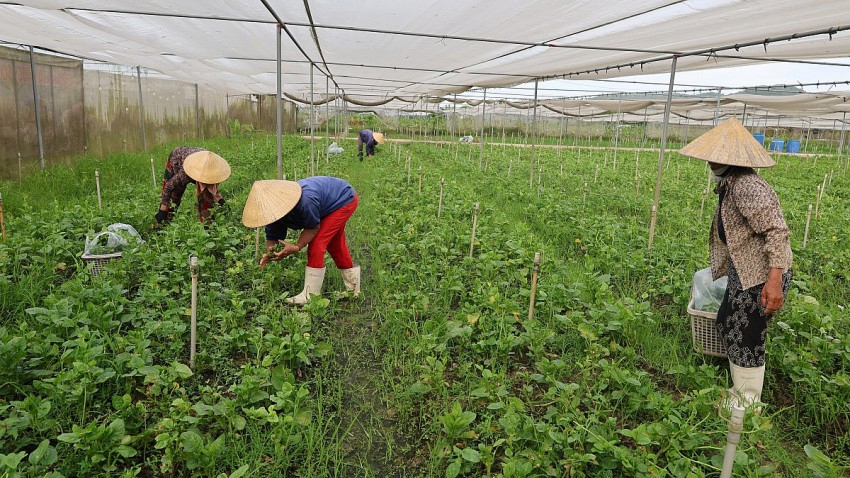
Sister Hien has bigger plans beyond vegetable cultivation. She is currently working on obtaining permits to offer agricultural tours and experiences. Her vision is to open the farm to students and city dwellers, teaching them about growing vegetables organically, making compost, and caring for chickens and pigs.
“Children these days only see packaged food in supermarkets, unaware of how vegetables grow or what chickens eat. I want them to feel the soil, see the grass and worms, and understand the hardships farmers endure to produce clean food,” she says, her eyes sparkling with enthusiasm.
The farm intends to build an experience zone where visitors can plant and harvest their vegetables and fruits. Sister Hien also plans to conduct small workshops on farming. Additionally, she is exploring value-added products such as jams, pickled vegetables, and essential oils from herbs to diversify their income streams.
“Farming today is not just about growing crops; it’s about embracing a sustainable lifestyle and connecting with the community. I want this place to be more than a vegetable farm; I want it to be a hub for promoting green living,” she asserts.
Reflecting on her nearly seven-year journey, Sister Hien concludes that the most important factor is perseverance. “I started with wasteland and my bare hands, and there were times when I thought I couldn’t carry on. But I believed that the land would not betray those who loved and cared for it. So, I persisted,” she says.
Government policies supporting land accumulation and clean agriculture have further fueled her determination. From a regular farmer, she has become a renowned owner of an organic farm. Without fanfare, she continues to toil in her fields, sowing seeds, and nurturing her plants. Where once stood waist-high grass, there now stretches a verdant landscape. This humble woman quietly tends to her land and her craft, holding fast to a simple belief: as long as she doesn’t give up, the plants will grow, flowers will bloom, and good things will come.
“Sustainable Agriculture in Thanh Hoa: Embracing Green Practices for a Prosperous Future”
Organic farming practices are gaining traction among households and cooperatives in Thanh Hoa province. By embracing eco-friendly and sustainable agricultural methods, they are producing goods that are not only safe for consumers but also environmentally conscious. This approach is pivotal to fostering long-term growth in the agricultural economy, minimizing environmental footprints, and promoting the well-being of the community.
Vinasoy Honored Among Top 50 Sustainable Businesses for the Second Consecutive Year
For the second consecutive year, Vinasoy has been ranked among the top 50 most sustainable businesses in Vietnam. This recognition underscores the company’s unwavering commitment to fostering community health and embracing sustainable practices as the cornerstone of its operations.
LPBank Joins Hands with Vietnamese Sports to Enhance Athletes’ Physical Prowess
During the recent five-day holiday marking the Liberation Day (April 30) and Labor Day (May 1), LPBank acted as the Gold sponsor for a series of promotional events introducing the Brazil-Vietnam Football and Tourism Festival in Da Nang, and supporting the organization of the friendly match between the Hanoi Police Club and the Brazilian Legends team at Hang Day Stadium – Hanoi.

